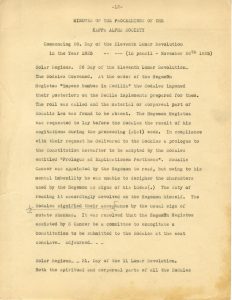[Addendum] Full Interviews with Professors and Students on the Tragic Death of Mahsa Amini in Iran
October 14, 2022
The following interview was conducted with two professors and one student on the recent death of Mahsa Amini and the subsequent protests in Iran. The Concordiensis has opted to publish the interviews in full in the interest of clarity. The omission of any of the following text from the October 13 physical edition of the Concordiensis was an omission based on the constraints of the paper medium. Online, that online constraint does not exist. The Concordiensis has not edited the following text, except for grammar and clarity, nor did it edit the physical copy of the paper but for the same reasons.
The death of Mahsa Amini came as a shocker to the world, who were appalled by the level of injustice that took place towards the woman just due to a mere violation of dress conduct. This unfortunate event did not only raise an eye toward the repression against women but also against police brutality in authoritative states like Iran.
Doris Zemurray Stone Professor of Modern Literary and Historical Studies, Professor of Political Science and American Studies Program Director, Lori Jo Marso and Professor of Economics, Eshragh Motahar commented on this event. Allyson Bennett’ 26 also commented on her views on this situation.
1. What was your reaction to this devastating event in Iran that took place a few weeks ago when you first heard it?
Professor Motahar: Profound sadness–the same as when I heard the news of Shireen Abu Akleh’s death. Or indeed the same as hearing the news of so many people, including women, being killed by the police in the US; for example, Breonna Taylor, as well as the stories of over a thousand people per year who are killed by the police in the US.
Professor Marso: Mahsa Amini was a 22-year-old Kurdish woman who was visiting Tehran when arrested by the “Morality Police,” and taken to the Vozara Detention Center where she was later reported to be dead. She was apparently arrested for not wearing the hijab correctly, which has been a way to harass and control women since a fundamentalist Islamic regime came into power in 1979. Of course, like many, I was horrified to hear of this murder, but I am inspired that so many in Iran are risking their lives by occupying the streets in mass protests. These protests have sparked what looks like a broader coalition across gender, age, class, and ethnic lines, which is a hopeful sign.
Allyson Bennett ’26: I heard about it when I read my morning news. It honestly gave me deja vu to the protests over the murder of George Floyd in the US.
2. We see a series of protests follow as a reaction to Amini’s death, but the law in Iran that directs women to cover themselves in a hijab while stepping out of their homes was there many years before this event took place. Why, according to your opinion, did the women not protest against it when it was established?
Professor Motahar: They have been protesting against it in one form or another for over four decades. They also have been protesting against other forms of oppression; e.g., the Draconian US sanctions imposed on ordinary people of Iran for forty-three years (including during COVID). The response of the “West” to Ms. Amini’s death, and the selective reporting of the mainstream media, has very little to do with women’s rights in Iran. Rather, it is a function of the “West’s” own political, imperial agendas and interests.
Professor Marso: Women have been talking, thinking, acting, and protesting forever. Since the 1979 revolution, there has been ongoing conversation as well as big and small actions that happen in public, private, and cultural spaces. When we think about protest, we need to broaden our view to consider everything from small acts of refusal (not covering the hair completely or wearing makeup under the hijab), to public demonstrations such as the ones that are occurring right now, to scholarly feminist debates amongst Iranian feminists who read the Koran with a feminist perspective to challenge Islamic fundamentalism. Iranian cinema and literature, too, have centered debates on divorce, custody of children, women’s discontent and anger, and the harms of fundamentalism for all these years, and increasingly in the past two decades. All these different kinds of moves can have an impact on shifting consciousness bit by bit and helping people feel bolder and more empowered to take action together.
Allyson Bennett ’26: I read Persepolis in high school English class and something they taught us about Arab culture is that some women wear hijabs, whereas others don’t. I don’t know if wearing hijabs was normal in Iran before the law, but I feel like women didn’t protest because it was either normal to wear a hijab or because they didn’t feel empowered to do so. People have died in recent protests, and my thinking is that people didn’t protest before because they were scared of death or being arrested. Now that someone has died, people feel angrier and more fed up at the law, so they’re willing to risk death or arrest.
3. Do you think the situation and especially the mandatory hijab law will change after this incident and the protests in Iran and all the other countries where hijab is a compulsory requirement for women?
Professor Motahar: I am reluctant to speculate. I take an evidence-based approach to analyzing phenomena. But, based on actual facts, the government in Iran has evolved over the past 43 years, and if one were to extrapolate, it is reasonable to conjecture that things might change. That is, “Oriental” societies are not static.
Professor Marso: We have no certain way of knowing what impact these protests will have. On the one hand, President Raisi and Supreme Leader Ali Khamenei have been uncompromising and have blamed the US and Israel for these demonstrations, turning their back on clear and obvious dissent and dissatisfaction amongst their citizens. On the other hand, these are the largest protests we have seen in some time, and in the last forty years there have been moments of change and reform, and perhaps this will be one of those moments. The hijab law has always been challenged by Iranian women in big and small ways, as mentioned in my response to the previous question, so it’s also possible that these protests will give women even more courage to continue this struggle and move the bar closer to freedom on this issue. And of course, it’s not just the hijab. Just as we in the US have politicized the wearing of the mask during COVID and we know that these debates are about much more than a small piece of fabric, the same is true when we are talking about the hijab in Iran.
Allyson Bennett ’26: If you have protests disrupting the normal flow of the country, I hope the Iranian government caves and removes the hijab mandate. After the protests against the murder of George Floyd in the US, police agencies banned chokeholds, changed their police training tactics, and promoted antiracism after protests.
4. What happened in Iran was completely inhuman and brutal, do you think it would be correct if other countries should intervene after what happened with Amini to ensure a basic level of humanity in the country?
Professor Motahar: The US sanctions on 85 million ordinary Iranians–in place for around 43 years–is completely inhuman and brutal. Regarding countries in the region, consider some actual facts: hundreds of thousands of women, as well as men and children, have been killed by the US (and its allies) in Afghanistan, Iraq, Libya, Syria, Yemen, etc. Many more have been maimed and/or made homeless. Therefore, based on that track record, any intervention by the US and/or its allies would be catastrophic for the people of Iran. Moreover, any call for intervention is degrading and demeaning. It assumes that women–in this case brown women–lack agency and they need someone with a “mission civilisatrice“–preferably white and from “the West” to come and rescue them. What this fails to recognize is that the proven US record on such “rescues” is so gravely flawed as to raise serious doubts about the “basic level of humanity” in U.S. foreign policy.
Professor Marso: We should absolutely not intervene if you mean military intervention. The US has a very clear record of inhumanity and brutality when militarily intervening in the affairs of other countries to do the work of what has been called “saving brown women from brown men.” I wrote about the heated feminist debates surrounding the 2001 US miliary intervention in Afghanistan, for example, when after the September 11th attacks on the World Trade Center, the bombing and invasion of Afghanistan was buttressed by claims to “save the women.” At that time, Afghan feminists were begging the US to not intervene militarily in their country and instead asking for other forms of support in their struggle against brutal Taliban rule. This is a complex topic because it is certainly true that conditions for women in Afghanistan did improve under US occupation and these tenuous gains have been eroded since the sudden US withdrawal that was initiated under President Trump. But in spite of the complexity of the Afghan case, I did not support the bombing and occupation of Afghanistan at the time, and I would never support US or Western military intervention in Iran. The US an ugly history of intervention in Iranian affairs, and some scholars would argue that it was the misguided rule of the Shah, a puppet of the US, that (indirectly or directly) led to Islamic fundamentalism taking hold in 1979.
When talking about the murder of Amini, it’s very important to remember is that it’s too easy for Western nations to point a finger at other nations and cultures to direct attention away from our own culture of misogyny. While we certainly can and should speak out against violence against women whenever and wherever we see it happening across the globe, it is very hypocritical, and politically regressive, to focus so much attention on how Iran requires hijab if we are not at the same time and in the same breath remembering that the United States Supreme Court is currently doing the work of misogynist, racist, and homo- and transphobic Christian fundamentalism. We need to remember that the US is catching up to, and even outdoing, Iran’s brutality in regard to abortion, for example, which is making the two countries much more alike, rather than different from each other, on these social issues!
Allyson Bennett ’26: Other countries can, but they haven’t had a significant event like this so I don’t think they will. Change really only happens after a lot of advocating or serious events happen.
5. What impression does this event leave on the powerful authorities like the police in authoritarian countries like Iran to the people in the contemporary world?
Professor Motahar: The “impression” is highly constructed (or as Chomsky would say, “manufactured”). Compare the effects “on the powerful authorities … in the contemporary world” of the death of Shireen Abu Akleh with that of Mahsa Amini. They are both women, one from Palestine, one from Iran. But despite some expressions of concern about Shireen Abu Akleh, little impression is left on the government involved in her killing, which continues with its killing, ethnic cleansing, administrative detention, and/or otherwise making life miserable for Palestinian women (and men). Moreover, what impression would this leave on a government like that of the US? Will it reduce the number of African-American women or Indigenous women being killed by the police? Also, it is “strange how little sustained US interest there is about women who “mysteriously” die in U.S. jails, prisons, and detention: Sandra Bland, Sarah Lee Circle Bear, Natasha McKenna, Kimberlee Randall-King, Latandra Ellington, Jacqueline Salyers, Sheneque Proctor, Tanisha Anderson, Anna Mae Aquash, Edwinta Deckard, Kelly Coltrain…”
Professor Marso: I would again caution that “people in glass houses should not throw stones” to borrow an old expression. Here we can remember too that here in the US, movements such as Black Lives Matter and their allies are rightly protesting the brutal and repeated killings of Black people at the hands of police in this country. Certainly, we should support Iranian women in their current struggle by learning more about their country, their history, their culture, their organizations, and their hopes for the protest movements currently unfolding. These are necessary and important alternatives to military intervention, and they require listening, humility, solidarity, and support.
Allyson Bennett ’26: As a US citizen, it makes me think that other countries aren’t that different from the US. They have injustices as well, and people are fed up with them.






